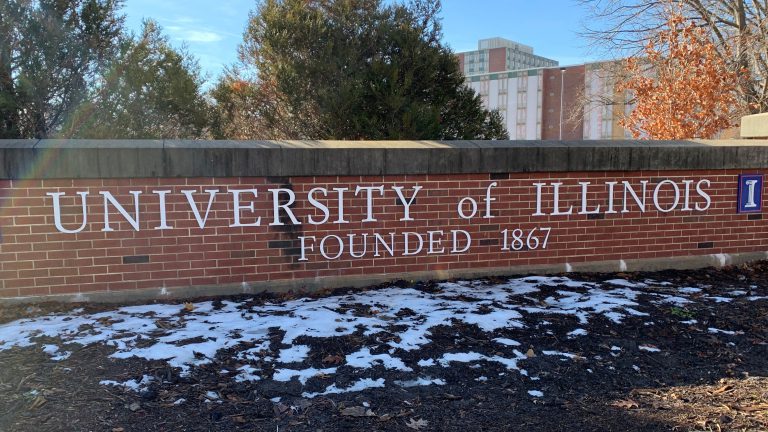Labor unions across the University of Illinois’ Urbana campus are bargaining with administrators on issues related to the COVID-19 pandemic. A group called the Campus Labor Coalition recently published an open letter to university administrators. The coalition represents graduate workers, faculty and other employees on the U of I campus.
The coalition’s requests span issues related to working conditions, healthcare costs and housing.
Working Conditions
The group has asked that the university provide employees who must still report to campus with adequate personal protective equipment, including masks and gloves, as well as additional pay, known as hazard pay.
In a statement, university officials say they plan to provide all equipment necessary to keep employees safe, but they do not plan to provide additional compensation in the form of hazard pay to workers who are required to report to campus.
Lila Ann Dodge, co-president of the Graduate Employees’ Organization (GEO), a union that represents graduate student workers, says employees are also grappling with challenges specific to working from home. She says many lack the internet speed necessary to perform their jobs to the best of their ability.
“Because of the amount of Zoom calls, video conferencing people are doing, high speed internet has been an issue for members. People do not necessarily have a strong enough internet connection to do all the work that we’re being asked to do,” Dodge says.
She says the university should provide a subsidy to employees so they can increase their internet speed at home. In a statement, university officials say they expect academic units to provide the resources necessary for employees to work from home.
Nick Goodell, operations coordinator for the Non-Tenure Faculty Coalition Local 6546, says working conditions for professors have changed rapidly, which “makes it hard to have a good learning environment and educational environment across the board.”
“If they’re working from home, that also means that now some people have a lot more childcare responsibilities than they used to… working conditions are rapidly in flux, which means that learning conditions are kind of going downhill,” he says.
In their statement, university officials say they have implemented the child and family care provisions addressed in the Families First Coronavirus Response Act recently passed by Congress. The law allows employees up to 10 weeks of paid family and medical leave at two-thirds of the employee’s regular rate of pay.
Goodell says members have also expressed concerns about potential lay-offs, given the economic impact of the pandemic. He says the unions are asking that employees receive at least 30 days notice if the university plans to lay them off.
In response, university officials say they would provide “appropriate notice” in the event they consider reducing the campus’ workforce ranks.
Healthcare
The Campus Labor Coalition has also requested that the university provide free COVID-19 testing to all employees regardless of their insurance status. University officials say they continue to work with local public health officials to test those who meet the standards for testing laid out by the Center for Disease Control and Prevention.
Additionally, union members want the campus to waive fees for healthcare, dental and vision care for the summer period.
Dodge says graduate student employees have to pay upwards of $600 to remain on the university health insurance plan throughout the summer. She says that’s a problem in the best of times, and particularly challenging for students who may not be able to work due to the pandemic.
“Most of us do research during the summer of one kind or another, but because that will be impossible, health insurance becomes a bigger issue.”
The coalition also wants the university’s Board of Trustees to reverse a recent decision to increase health insurance premiums by 33% for undergraduate and graduate students on the Urbana campus.
In a statement, university officials say they plan to follow guidance from the state’s Department of Central Management regarding health benefits. They say the decision to increase premiums was made irrespective of the COVID-19 pandemic, and that campus officials cannot supersede the Board of Trustees’ decision.
Housing
Both Goodell and Dodge say it’s crucial that the university provide free summer housing to international workers who cannot return to their home countries due to the pandemic.
“We’re seeing every day there’s a new news story about a country that has decided that they’re going to close their borders for the foreseeable future to everybody in light of the pandemic. And so there are just people who cannot return home. They don’t have anywhere to go. So, ensuring that they do have that housing access over the summer is critically important to us,” Goodell says.
He says international workers are especially vulnerable because there are strict limits on where and for how long an international employee can work.
Additionally, the unions have requested the university provide free housing to any employee who loses their job with the campus and is, as a result, unable to afford their current living situation.
“The university has a lot of dorm buildings, as we all know, that are currently empty, and presumably will be empty for some time. And so we think that those are resources that could be used to really serve the community,” Goodell says.
University officials say they have no plans to offer free housing to anyone.
Goodell says he hopes the letter published by the Campus Labor Coalition will encourage university officials to think outside the box about potential relief for workers during the COVID-19 crisis.
“We’re not trying to so much to shame the university administration as we are trying to, I think, just call them to see some possibilities,” Goodell says.

